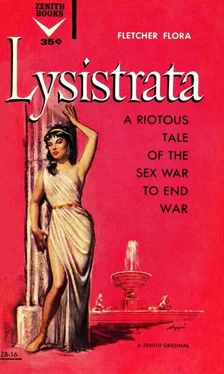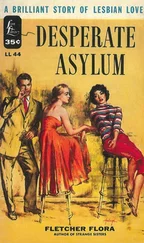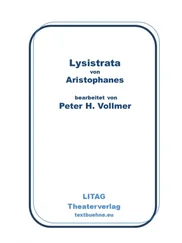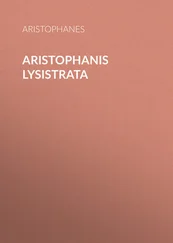Fletcher Flora - Lysistrata
Здесь есть возможность читать онлайн «Fletcher Flora - Lysistrata» весь текст электронной книги совершенно бесплатно (целиком полную версию без сокращений). В некоторых случаях можно слушать аудио, скачать через торрент в формате fb2 и присутствует краткое содержание. Город: New York, Год выпуска: 1959, Издательство: Zenith Books, Жанр: Историческая проза, comedy, на английском языке. Описание произведения, (предисловие) а так же отзывы посетителей доступны на портале библиотеки ЛибКат.
- Название:Lysistrata
- Автор:
- Издательство:Zenith Books
- Жанр:
- Год:1959
- Город:New York
- ISBN:нет данных
- Рейтинг книги:5 / 5. Голосов: 1
-
Избранное:Добавить в избранное
- Отзывы:
-
Ваша оценка:
- 100
- 1
- 2
- 3
- 4
- 5
Lysistrata: краткое содержание, описание и аннотация
Предлагаем к чтению аннотацию, описание, краткое содержание или предисловие (зависит от того, что написал сам автор книги «Lysistrata»). Если вы не нашли необходимую информацию о книге — напишите в комментариях, мы постараемся отыскать её.
Seven months of lonely days and empty nights — of aching heart and throbbing loins. Seven months of longing.
But now a strange smile played around her lips.
Tonight he was coming home—
Lysistrata — читать онлайн бесплатно полную книгу (весь текст) целиком
Ниже представлен текст книги, разбитый по страницам. Система сохранения места последней прочитанной страницы, позволяет с удобством читать онлайн бесплатно книгу «Lysistrata», без необходимости каждый раз заново искать на чём Вы остановились. Поставьте закладку, и сможете в любой момент перейти на страницу, на которой закончили чтение.
Интервал:
Закладка:
6
“The eels are delicious,” said Cadmus. “As something of a connoisseur, I declare that I have never eaten better.”
“I agree,” said Acron. “They are truly superior.”
Leaning over from the couch on which he lay propped on one elbow, he helped himself to the esteemed fish and popped a generous bite into his mouth. The table was loaded with vegetables and cheese and grapes and flat honeycakes, in addition to the eels, and a slave was present to pour wine as it was needed, which was frequently.
“It’s the cook,” said Lycon. “He’s an insolent fellow and would rather lie than tell the truth, even when the truth would be an advantage, but I suppose it is necessary to overlook such things in someone with genuine talent.”
“That’s true,” Cadmus said. “It has always been the practice to excuse exceptional talent from a strict adherence to the rules. Consider Socrates, for example. There is no question but that he is sceptical of our gods and teaches unusual doctrines in the marketplace, but he is properly excused because he is a philosopher with more brains than is ordinary, and in my opinion he may even be remembered by our grandchildren.”
“Well, I don’t know that I agree with you entirely,” said Acron. “I agree that he is excused, since no action is taken against him, but I disagree that it is proper. It is no small matter to doubt the gods, which is an attitude that may bring disaster upon us all, and I predict that he will eventually come to a bad end.”
“The trouble with Socrates,” said Lycon gloomily, “is that he has a bitch of a wife.”
Acron, detecting a special significance in the remark, looked at Lycon with open sympathy. Helping himself to a cluster of grapes from the table, he ate three in succession before responding.
“True,” he said. “I am more inclined to excuse him on the grounds of his wife than on his exceptional brains. If I had a wife like Xanthippe, I would be a philosopher also.”
Cadmus, aware of subtleties which he couldn’t quite grasp, looked sharply from Acron to Lycon and back again. Acron continued to eat grapes, and Lycon looked into his wine gloomily.
“Regardless of the grounds on which you may be inclined to excuse him,” Cadmus said, “it is certain that he is an exceptional man and is therefore falsely accused of many offenses by people who are not exceptional at all. You will have to admit that this is a common practice and always has been. Recall, for instance, the persecution of Pericles himself. And as for the disaster you fear he may bring upon us, this is nonsense comparable to the charge that he corrupts the young.”
“Well,” said Lycon, “it is apparent that something is bringing disaster upon us, for we are being beaten by Sparta these days at every turn.”
“Perhaps,” said Acron, looking at Cadmus with sly malice, “it is because we eat too many eels. Wasn’t the eating of flesh considered a cardinal sin by your precious Empedocles, Cadmus?”
“It’s true,” said Cadmus, “that Empedocles believed in transmigration and therefore condemned the eating of all flesh as the cannibalistic consumption of reincarnated humans.”
“That was my impression. I am no authority on Empedocles, as you are, but I am bound to say that I can’t understand how you can profess to follow his teachings and still be a connoisseur of eels. Perhaps that very bite you now have in your fingers is a morsel of Empedocles himself.”
“Considering that there are millions of eels and only one Empedocles, the odds are against it. Moreover, I reject the theory of transmigration. It is possible to accept the substance of his teaching without swallowing all the details.”
“That’s because you would rather swallow the eels. Do you believe that he miraculously cured the sick and practiced magic and was in fact, as he claimed, a god?”
“As for me,” said Lycon, “I no more believe that he was a god than I believe he is now an eel. To tell the truth, this discussion bores me more than a little, and I don’t know how we got into it.”
“We were trying to decide why the Spartans are beating us at every turn,” explained Acron. “You are the one who brought the subject up, Lycon, if you will kindly remember.”
“Well, I didn’t intend to initiate an interminable discussion of the theories of Empedocles, which is all too easy to do where Cadmus is concerned. I am convinced that our misfortunes can be explained more simply.”
Cadmus shrugged and consumed another bite of eel. He washed the bite down with wine and extended his empty goblet to the slave for a refill.
“I must say, Lycon,” he remarked amiably, “that you are quite touchy this evening. After all, it is only the most basic hospitality to let your guests bore you if they please. If you had not just returned to the pleasures of Athens from Pylos, I would swear that you are not happy.”
“I apologize for my bad manners,” said Lycon. “As you have detected, I am somewhat depressed by something that has occurred.”
“Rather, something that has not occurred,” Acron said.
He laughed at his little joke, and Lycon looked at him with distaste and did not join in the laughter. As for Cadmus, he was palpably confused and curious and did not know if it was proper to be amused or not.
“I believe,” he said, “that there is a meaning in these remarks that I don’t grasp.”
“Quite likely,” Lycon said.
“Well,” Acron said, “I propose that we sing some odes. The singing of odes will sometimes work wonders in lightening the spirit.”
“I don’t believe I care to sing any odes,” Lycon said. “Excuse me, please.”
“You don’t care to sing odes?” Cadmus said. “Really, Lycon, you are in a deplorable state. A merry feast among friends is hardly complete without the singing of odes.”
“Nevertheless, I don’t care to sing any.”
“Perhaps you would care to tell us what is depressing you. Whatever it is, it is obviously critical, and you are surely aware that it is dangerous to keep such things entirely to yourself. I had a friend who did that when he suspected that his consort was entertaining a minor poet on the side, refused to tell a soul about it, and he eventually went mad, if you’ll believe it, and had to be confined.”
“Well,” said Lycon bitterly, “I certainly see no necessity for singing odes to cheer me up so long as you are here to talk to me, Cadmus. You are probably one of the most cheering influences I have ever encountered.”
“He is curing you with words,” said Acron, “which is something he learned from Empedocles. Isn’t it true, Cadmus, that Empedocles claimed to cure various diseases and maladies with words?”
“At the risk of being considered inhospitable again,” said Lycon, “I would like to request that we avoid bringing Empedocles into the conversation.”
“All right,” said Cadmus. “I can easily see that my solicitousness is not wanted. Excuse me for imposing my attention upon you.”
“Oh, come off, Cadmus. You mustn’t become offended.” Lycon signaled the slave to replenish goblets. “I suggest that we drink some more of this good wine, which is from the Cyclades and is infinitely superior to words, if you ask me, in the curing of depression.”
“Good wine is hard to beat,” said Cadmus. “You are right there. Would you believe that a fellow tried recently to convince me that beer is a superior drink?”
“Beer is for barbarians,” Acron said.
“The man was obviously a maniac,” Lycon said.
United in favor of wine, they applied themselves to the drinking of it. Cadmus belched and did not even bother to ask pardon. He was trying very hard to act indifferent to the obvious fact that Lycon and Acron had a secret between them that they were determined not to share, but all he accomplished was to give the appearance of being sulky. It was not fair or courteous, in his judgment, for two friends making merry at a feast of eels and other good things to keep a secret from a third. The harder he tried to achieve an attitude of indifference, the more offended he felt, and the sulkier he looked. He was, in fact, beginning to feel that the situation smacked of conspiracy, and that he was somehow being made a fool of. The only honorable thing to do in the circumstances, he thought, was to retire with dignity.
Читать дальшеИнтервал:
Закладка:
Похожие книги на «Lysistrata»
Представляем Вашему вниманию похожие книги на «Lysistrata» списком для выбора. Мы отобрали схожую по названию и смыслу литературу в надежде предоставить читателям больше вариантов отыскать новые, интересные, ещё непрочитанные произведения.
Обсуждение, отзывы о книге «Lysistrata» и просто собственные мнения читателей. Оставьте ваши комментарии, напишите, что Вы думаете о произведении, его смысле или главных героях. Укажите что конкретно понравилось, а что нет, и почему Вы так считаете.












